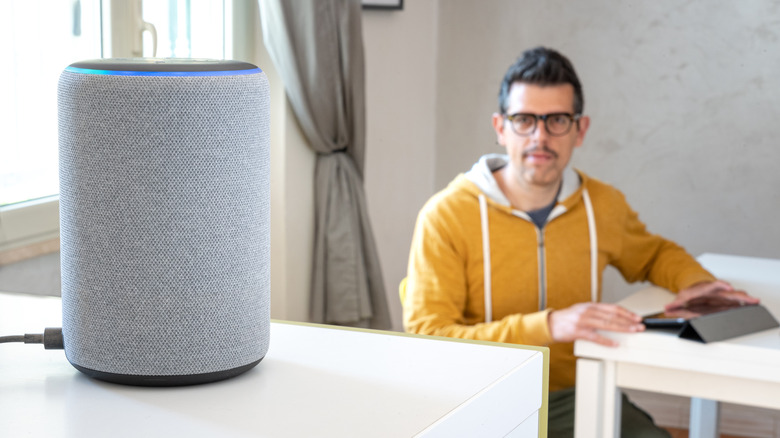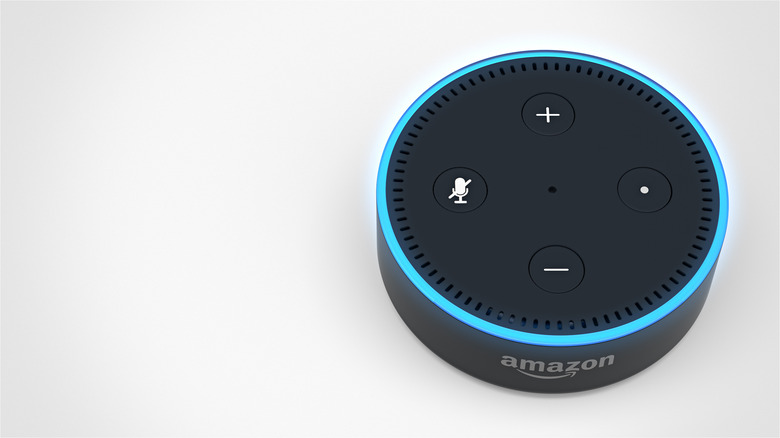How To Tell If Your Amazon Echo Is Spying On You, And What You Can Do About It
We may receive a commission on purchases made from links.
An estimated 35% of US adults own a smart speaker. In 2021, some 91 million smart speakers were active in the United States, and it's estimated that as many as 95 million will be in use in 2022. According to Omdia, Amazon owned a 64.7% market share in 2020, which dipped sharply last year to 44.1%.
Despite privacy concerns over a smart speaker's ability to listen and record your most intimate conversations, many people are still buying and using them in their homes. But with all things "smart" — including your phone, television, watch, refrigerator, etc. — there are some things to keep in mind.
First, to be "smart," your device needs to have access to some form of data input. Your Apple Watch needs your body's biometric data to work. Your phone's GPS mechanism tracks your daily movements. Alexa or Siri need to hear your voice when you ask them to tell you a joke. Without these inputs, they're no smarter than your average bear.
In the case of Amazon and its suite of Alexa-powered Echoes and Dots, yes ... they are always listening, but they're doing so passively. Only after the wake word — "Alexa," "Echo," "Amazon," or "Ziggy" — has been mentioned does it start recording using a built-in technology known as keyword spotting. If you see the blue and green light swirling around the outer edge of the device, Alexa is actively listening.
This tech allows the device to analyze your voice and match it to the audio sample it has on file for whatever wake word you've chosen to activate the little bugger. Without the right wake word and the corresponding voice print match, it technically should not start. But, we know that's not exactly true.
Smart devices are only as smart as you let them be
How often have you been watching television in a room adjacent to a smart speaker, and suddenly you hear the voice of Alexa pipe up for no apparent reason? Likely too often to be reasonably confident that she's not listening in on you. Well, you're not alone.
In 2019, researchers from Northeastern University and the Imperial College of London spent six grueling months streaming more than 130 hours of Netflix content into an assortment of smart speakers to see what would happen. Their findings confirmed that we are, in fact, not crazy and that smart speakers were randomly activating and recording up to 19 times a day. The team found that approximately half of the "accidental activations" lasted a mere six seconds or less, but... the other half could record your musings for as long as 43 seconds.
According to the study, devices that had "Alexa" as their wake word could accidentally be activated if a sentence started with "I" followed by a "K," such as "I care about" or "I got something." Devices that used "Echo" as the wake word got activated by words containing a vowel plus "k" or "g" sounds, like "head coach," "I got," or "that cool."
A more recent study conducted by Cornell University found that Amazon and its advertising and tracking partner services are keen on collecting the data from all those smart speaker interactions. In fact, they found that Amazon analyzes that voice data to target ads on its Echo devices and the web. They also found that the data from these smart speaker interactions lead to advertisers paying as much as thirty times more for ad bids.
Make Alexa deaf if you don't want her to eavesdrop
Almost everything around us collects data about us to get "smarter" and better target ads directly to us. Amazon, Apple, Google, and virtually every other company selling smart devices want your money; forever if possible.
If you feel the privacy risks outweigh the convenience these smart speakers provide, you can either remove them from your home or take some easy steps to help mitigate those risks.
The simplest and most effective way is to make the device deaf by turning off its microphones. Push the microphone button, and a red light will appear, indicating the device can no longer hear anything you say. However, while in this mode, it won't detect your wake word or send any audio to Amazon's secure cloud. You'll have to press the microphone button again so Alexa can resume hearing (via Amazon).
Another step is deleting the voice recordings your device has already stored and preventing it from saving future recordings. Amazon lets you control what's been recorded by allowing you to view/hear them all and delete whichever ones you want. This can be done by asking: "Alexa, how do I review my privacy settings?" or going into the app (Settings > Alexa Privacy> Review Voice History). You can also keep Alexa from saving any future voice recordings.
Review, update or revoke permissions given to the Alexa Skills on your device. These third-party apps help Alexa be all she can be, but usually at the cost of a cell number, address, or other personal information. Make sure to routinely check what skill app has what permissions (Settings > Alexa Privacy > Manage Skill Permissions) and change them accordingly.
Common sense is your best weapon against living in the digital smart age.


